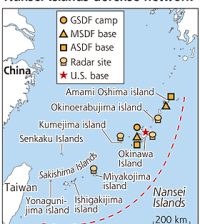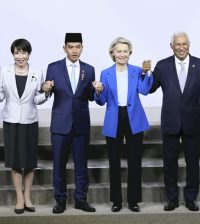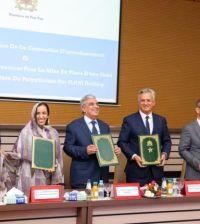- Washington “follows with interest” Morocco’s openness onto Africa (John Kerry)Posted 12 years ago
- The trial of South African Paralympic champion Oscar Pistorius opened in Pretoria on Monday.Posted 12 years ago
- USA welcomes efforts of King Mohammed VI in MaliPosted 12 years ago
- Egypt’s population reaches 94 millionPosted 12 years ago
- Mugabe celebrates his 90thPosted 12 years ago
- Moroccan Monarch to Build a Perinatal Clinic in BamakoPosted 12 years ago
- King Mohammed VI handed a donation of bovine semen for the benefit of Malian breeders.Posted 12 years ago
- Moroccan King’s strategic tour to Africa: Strengthening the will of pan African Solidarity and stimulating the south-south cooperation mechanisms over the continentPosted 13 years ago
- Senior al-Qaida leader killed in AlgeriaPosted 13 years ago
- Libya: The trial of former Prime Minister al-Baghdadi AliPosted 13 years ago
China Deepens Global Partnerships With Ethiopia and Russia, Signaling a Shift Toward Multipolar Cooperation
Two recent developments – Ethiopia’s elevation to All-Weather Strategic Partner with China and the ratification of the China–Russia Mutual Investment Protection Agreement (MIPA) – highlight Beijing’s expanding global influence and its role in reshaping the structure of international cooperation. Together, these initiatives illustrate a broader reconfiguration of the world order, emphasizing multipolarity, strategic autonomy, and alternative models of globalization beyond Western dominance.
Ethiopia: China’s First African “All-Weather” Partner
Ethiopia has become the first African country to establish an All-Weather Strategic Partnership with China – a status reflecting high political trust, long-term development cooperation, and shared global outlook. The agreement builds on a decade of growing engagement, formalized during Prime Minister Abiy Ahmed’s 2023 visit to Beijing, and reaffirmed at the 2025 BRICS Summit in Rio de Janeiro, where Abiy met with Chinese Premier Li Qiang to discuss cooperation in infrastructure, digital innovation, and industrialization.
Chinese Embassy Chargé d’Affaires Sun Mingxi emphasized the partnership’s depth, noting that it demonstrates “the continuity of political trust and the expansion of practical cooperation.” Since July 2025, multiple Chinese delegations – including those from the Ministries of Industry and Technology and the China International Development Cooperation Agency (CIDCA) – have visited Addis Ababa to advance projects in connectivity and digital economy.
The partnership’s tangible outcomes include the Xiamen–Addis–São Paulo air cargo corridor, which has handled nearly $750 million in trade across 600 flights. As a new BRICS member, Ethiopia’s cooperation with China also strengthens its position in multilateral forums, including the UN and the African Union, where both countries advocate economic globalization and multilateralism over unilateral policies.
Russia: Legal Framework for Economic Sovereignty
On a broader geopolitical scale, the China–Russia Mutual Investment Protection Agreement (MIPA), ratified in October 2025, marks a pivotal moment in the evolution of non-Western economic alliances. The agreement provides a robust legal framework safeguarding investments between the two countries amid intensifying Western sanctions and protectionist policies.
According to Reuters and Kommersant, the MIPA includes national treatment, most-favored-nation status, and protection against expropriation, while also promoting local-currency transactions in yuan and rubles, bypassing the U.S.-dominated SWIFT system. Disputes are to be resolved in neutral arbitration centers such as Singapore or Hong Kong, and the agreement introduces a Joint Investment Protection Council (JIPC) and a sovereign-risk insurance fund to protect against sanction-related shocks.
For Russia, the agreement opens channels for alternative investment and technology partnerships, while for China, it secures access to energy and raw materials, reinforces Belt and Road connectivity, and demonstrates leadership in building a post-dollar economic order. Analysts describe this alignment as a “strategic symbiosis” – one that enhances both nations’ financial resilience and geopolitical leverage.
Broader Global Implications
The MIPA’s implications extend beyond China and Russia, offering a prototype for Global South cooperation. Countries such as Indonesia, Brazil, and Nigeria are reportedly studying similar frameworks that blend investment protection with currency diversification and joint risk mechanisms. Within BRICS, the pact complements initiatives like the New Development Bank and Contingent Reserve Arrangement, reinforcing the bloc’s ambition to de-dollarize trade and finance.
Meanwhile, the growing integration of Russian energy, Chinese finance, and Central Asian logistics networks is giving rise to a Eurasian economic corridor that challenges established supply-chain structures. The Bank of Russia reported that yuan–ruble transactions rose from 15% in 2020 to nearly 90% by mid-2025, underscoring what analysts now call “currency geopolitics.”
A Redefinition of Globalization
Both the Ethiopia–China partnership and the China–Russia MIPA underscore a global transition from dominance by Western institutions to diversified centers of influence. These initiatives reflect a new philosophy of engagement – one that privileges mutual respect, sovereignty, and economic complementarity over ideological alignment.
As Ethiopia strengthens its diplomatic reach and China and Russia institutionalize their financial cooperation, the contours of a new polycentric international order are becoming clear. This emerging system does not reject globalization but seeks to redefine it – positioning –legal trust, strategic self-reliance, and South–South cooperation– as the foundation for the next phase of international relations.




